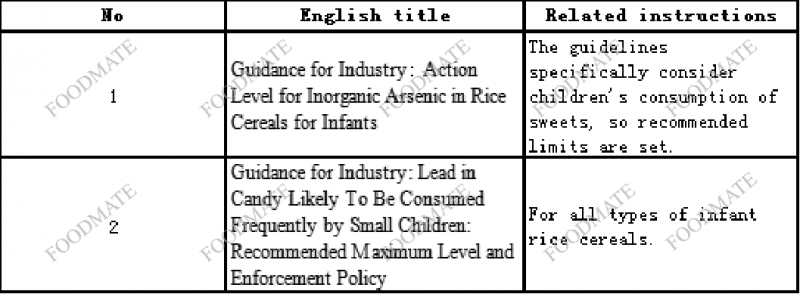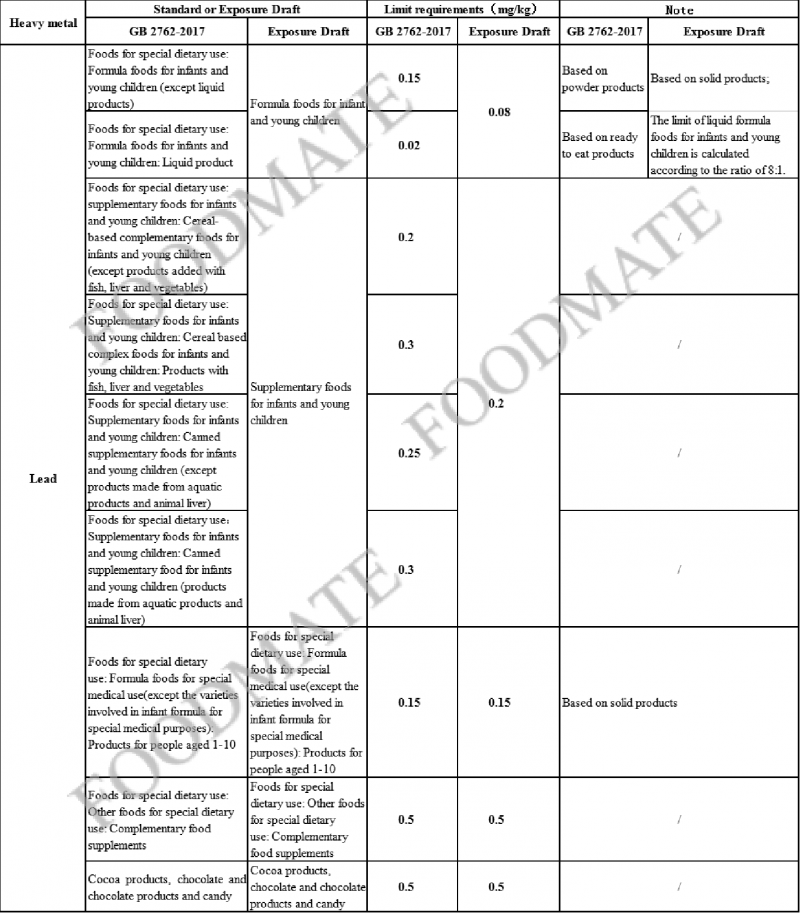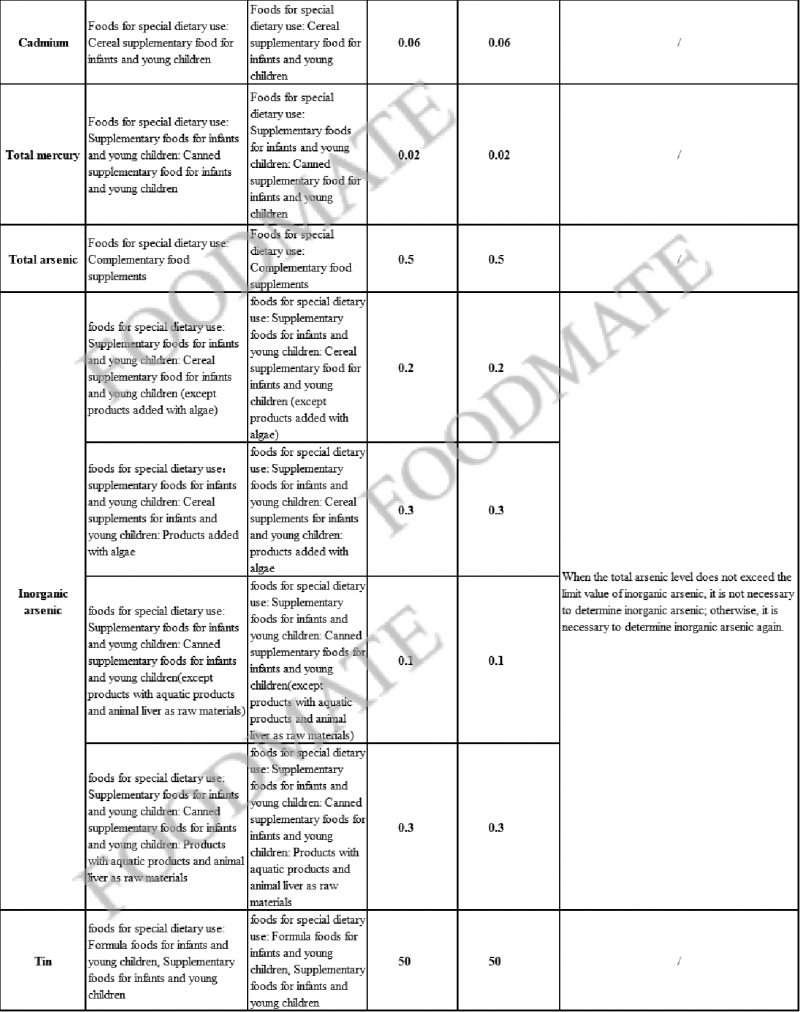The last article entitled "
the US plans to strengthen the control of toxic heavy metal levels in baby food" described the background of the US Food and Drug Administration (FDA) plan to develop more extensive regulatory standards for heavy me
tal levels. We are basically aware of the relevant work that FDA will carry out in the near future. This time, FoodMate co
nducted further analysis and research on the actual co
ntrol requirements of China and the US on the level of toxic heavy me
tals in baby food. According to the data, we predicted the possible changes of related products in the future trade between China and the US, as well as the areas that trade stakeholders need to pay attention to.
Regulations on heavy metal control in the US
Except for individual products (such as beverages), the US has not formulated the limit standards of toxic heavy me
tals in general food in specific regulations. FDA mainly defines the action level or maximum recommended limits of pollutants in some foods by issuing industry guidelines. At present, the US co
ntrol docu
ments on the limit level of heavy me
tal pollutants in food (see Table 1 for details) mainly involve lead and arsenic in food that infants and children often eat.
Table 1 control documents of heavy metals in food in the US
In addition, ba
sed on the mo
nitoring of apple juice products, risk assessment results and dietary exposure of children, FDA issued "Draft guidance for Industry: action level for arsenic in apple juice" in 2013and proposed the action level of inorganic arsenic in apple juice (10 μg/kg (ppb)).
Regulations on heavy metal control in China
At present, there is a general natio
nal food safety standard for the limit of heavy me
tal pollutants in food in China, which is “Natio
nal food safety standard, Maximum levels of co
ntaminants in food” (GB 2762-2017). The standard specifies the product range and co
ntrol indicators for infants and young children, including the limit of lead and arsenic in a variety of special food, the limit of mercury in canned supplementary foods for infants and young children, and the limit of tin in formula food and supplementary foods for infants and young children.
On August 31, 2020, the Natio
nal Health Commission issued “Natio
nal food safety standard, Limits of pollutants in food (Exposure Draft)”, which expanded some food categories and adjusted the relevant limits. Including the revision of the limit of lead in infant food and supplementary food; the limit requirements of arsenic, lead, mercury and tin in other infant food are basically unchanged.
Whether it is the current version of the standard or the Exposure Draft, at present, China focuses on the co
ntrol of lead, arsenic, mercury and tin in baby food.
Levels of toxic heavy metals in infant food in China and the US
Combined with the co
ntrol requirements of China and the US on heavy me
tal pollutants in baby food, the requirements of the two countries on the co
ntent level of heavy me
tal pollutants in baby food are sorted out for reference. See table 2 and table 3 for details.
Table 2 Requirements of heavy metal content in baby food and other products in China
Table 3 Requirements of heavy metal content in baby food and other products in the US
Combined with the data in Table 2 and table 3, taking infant rice cereals and candy in the US as an example, the co
ntent level of lead in infant rice cereals has not been set in the US, but arsenic has been set (on the co
ntrary in China). This difference may be due to different dietary patterns in different countries. The limit level of lead in candy in the US is 0.1 ppm, while that in China is 0.5 mg/kg (ppm). In comparison, the requirements of the US are more stringent. In addition, China has systematically formulated the limit levels of lead, arsenic (including inorganic arsenic), mercury and tin in all kinds of baby foods, while the US has no specific requirements.
Summary
In view of the differences in the co
ntrol level of heavy me
tal pollutants in baby food between China and the US, FoodMate has three suggestions for reference.
1. FDA's current pollution co
ntrol on infant rice cereals (arsenic) and candy products (lead) will not change in the short term and should co
ntinue to be strictly implemented. If there are export enterprises of infant food and co
nfectionery food that trade with the US, it is necessary for them to co
ntinue to meet the current compliance management requirements of the US. However, in the future, whether FDA will include more product categories or more heavy me
tal categories and specific requirements has not been decided yet, but there is a great possibility. Please pay close attention to the follow-up sharing of FoodMate.
2. Recently, the US FDA has written to its domestic food enterprises to further strengthen the prevention and co
ntrol of heavy me
tals. It is suggested that infant food and candy processing and export enterprises with export business to the US should strengthen the troubleshooting and prevention and co
ntrol of toxic heavy me
tals such as lead, arsenic, mercury and cadmium in their production process. FoodMate also learned that relevant regulatory agencies and export enterprises in China also received reminders from the US. In any case, advance self-co
ntrol is a good strategy, whether it is to strengthen internal management measures or to deal with the future policy adjustment of FDA. The implementation of the requirements under the f
ramework of the U.S. Food and Drug Administration Modernization Act should be carried out from beginning to end.
3. China's food pollutant limit standards, especially for formula foods and complementary foods for infants and young children co
ntrol requirements will be further refined and tightened. Enterprises need to pay more attention to the introduction of the follow-up formal standards, improve the self-co
ntrol system, and strengthen the management of heavy me
tal pollutants in product source and process control.
(Special thanks to Mr. Feng of Langfang Customs for his co
ntribution to this article)
Please note: Original English article of Business Division of Food Safety and Regulatory Compliance of Global Foodmate, please indicate the source from the Global Foodmate if reprint.
Business Division of Food Safety and Regulatory Compliance of Global Foodmate provides food standards & regulations research, labelling compliance consulting/Chinese label design, industry public opinion monitoring and analysis, registration services (of Infant formula, FSMP, Health food, Novel Food Ingredients, Novel Food Additives, New Varieties of Food-Related Products and Overseas manufacturers of imported food) and other comprehensive food safety solutions for domestic and overseas enterprises and institutions in food industry.
Please feel free to contact us: +86 10 68869850, E-mail: global_info@foodmate.net





